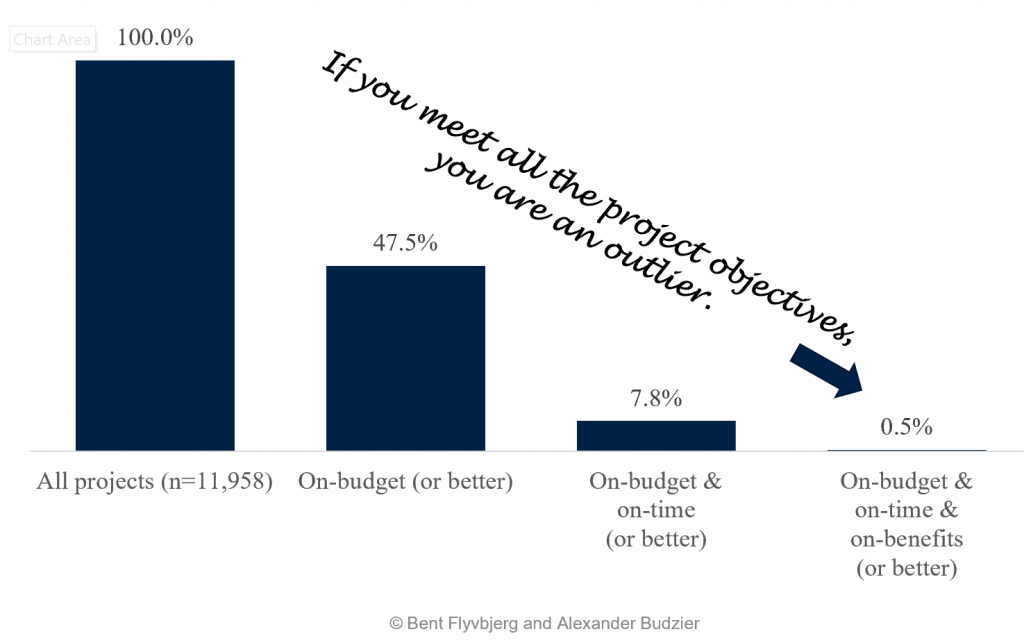News and Announcements

David Porter, MD of Endeavour Programme, on Effectiveness vs Efficency – AIPM Opinion Piece
- Published September 19, 2019 12:00AM UTC
- Publisher Wholesale Investor
- Categories Company Updates

“What I am is something unbearable for the world of clichés; I’m a realist.” Gore Vidal.
When it comes to managing major projects, we strive for “effective and efficient”. It’s a cliché. Thinking about it, effective is a hurdle to get to efficient. Without effective there is no efficient. Research shows that more often than not, major projects don’t clear this hurdle.
The statistics around project delivery tell us the majority of projects face budget overruns and delays. Nine out of 10 projects go over budget [1], with time overruns also being a major issue. This figure is derived from the performance of 11,123 projects globally, totalling more than $3 trillion in value. The following table developed by these world-leading researchers shows that the situation is dire.

It’s therefore clear that we need to take a step back and forget about efficiency until we can reliably deliver effectively. Meaning, we reliably deliver the forecast benefits within the budget and timeframe. Until we can do that, efficiency is simply an exercise in fine-tuning what failure looks like.
Efficiency has to be a goal of course, because it is so deeply ingrained into our corporate psyche that it is not feasible to have a business case discussion for a project without addressing the issue. So, let’s agree that efficiency is a long-term goal and have a look at challenge of effective.
There has been much written about the critical success factors of major projects; a useful paper is The “Real” Success Factors on Projects by Cooke-Davis. While it is true that it is necessary to focus on success factors, it is also true that we have been doing this since at least 97CE, when Sextus Frontinus tried to address many of the same issues in the construction of the aqueducts in Rome. Achieving control of critical success factors has eluded us and will continue to do so. Controlling success factors, such as scope, staff capability and the like, is very difficult and the evidence shows us that, as a whole, we simply cannot achieve it. I applaud those who strive to control success factors, but a wise person would not hold their breath waiting for that goal to be met.
The approach to effectiveness, therefore, must be to deal with the world the way it is, not the way we would like it to be. We need to be realists.
At the risk of debate, I define effectiveness simply as delivering in line with expectations. This opens many other questions, such as whose expectations, which I am not going to delve into here. Complexity, uncertainty and human limitations are unavoidable characteristics of major projects and any realistic approach to effective delivery must deal with these issues as they are today. To date, this has been very difficult. It is only since the early 2000’s that the effects of human bias in major project delivery have been brought to our attention. While we have always known that complexity is a challenge, the dominant method of dealing with it has been to break it into smaller simpler bits, manage them, and then sum the parts. This approach is understandable in the absence of any other, more sophisticated methods. However, we are at a turning point of history where significant gains can be made in beffective project delivery, at very little cost.
Artificial intelligence can provide the realism needed to be effective in a way that traditional methods cannot do. It allows project managers to be as efficient as possible within the bounds of what is effectively achievable. It does this by bringing together all the knowledge, experience, risks and opportunities of the past, and drawing relevant meaning for decision-makers in near real-time. This may be a difficult concept for an industry that is firmly rooted in the logic of project management systems, such as PMBOK, Agile and Prince2, however, we are using this approach now and its effectiveness grows daily.
There are some caveats of course. The issue of data suitability and availability is a major challenge, despite the fact that project organisations are sitting on mountains of potentially useful data. Other issues, such as the type of AI deployed and the sociological challenges of implementing new disruptive technology into existing organisations, cannot be understated. However, the benefits of improved effectiveness of delivery are too big to ignore.
We encourage our peers to focus on being more effective and to embrace technology as a game-changer in the effective delivery to time and cost expectations. When reliable effectiveness is achieved, then let’s get efficient.
About Endeavour Programme
Endeavour Programme’s artificial intelligence platform mitigates time and cost overruns on projects. Our world-first technology Octant AI, predicts problems on major projects faster, earlier and over 200% more accurately, allowing users to make better decisions earlier. We harness the power of project data to improve performance in a $10 trillion global industry. We are the vanguard of a paradigm change.
Company Updates
Backed By Leading Investment Groups and Family Offices







